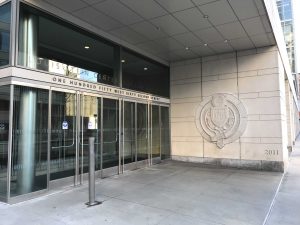By Helen Stevenson
Growing offerings in entertainment and media law have led Fordham Law to become a name for those interested in the field as well as a place for conversation. The House Judiciary Committee held its field hearing for copyright and entertainment law at the school this past January, and in 2017, Billboard Magazine named it a top music law school.
Fordham’s offerings in media and entertainment law make it worthy of these recognitions, according to Darien Schwartz, Fordham Law ’18 and president of The Fordham Media & Entertainment Law Society.
“This is not a coincidence,” said Schwartz. “Fordham Law is one of the foremost producers of entertainment lawyers in the world.”
In the evolving music industry, entertainment lawyers serve as advocates for artists and songwriters. Their legal expertise extends to issues of contract law, intellectual property in the digital age and social justice in entertainment.
The university has a wide range of offerings related to the entertainment industry and a highly involved alumni network whose members are passionate about giving back to the school in any way that they can, according to Schwartz.
Graduates from the university include the COO of Capitol Music Group, Michelle Jubelirer, and Executive VP of Warner Music Group, Paul Robinson.
In terms of course offerings, Fordham Law provides classes related to general entertainment law, entertainment drafting and media drafting. These classes offer opportunities for law students to gain the practical knowledge required for music or entertainment law.
Schwartz said that the experience and knowledge available to Fordham students is extremely valuable to aspiring entertainment lawyers.
“Entertainment lawyers are really a breed of their own and it requires a lot of industry-specific knowledge,” he said. “If you aren’t familiar with industry standards, these contracts are daunting and, frankly, they don’t make sense … To gain that knowledge before graduating law school is invaluable.”
Outside of the classroom, the university has the Fordham Intellectual Property, Media & Entertainment Law Journal (IPLJ), a yearly publication composed of four books related to all areas of intellectual property law, in discussion with relevant issues in the entertainment industry.
The Media & Entertainment Law Society (MELS), a student-run organization led by Schwartz, is another opportunity for students interested in entertainment law. The group supports students interested in areas of the law relating to film, music, publishing, art, theater, the Internet, technology and mass media.
“We host on a number of panels with prominent entertainment lawyers who come in and speak on pertinent issues within the entertainment industry,” said Schwartz.
In March, the Society will host its fourth annual symposium dedicated to entertainment and law. Established practitioners from all disciplines in entertainment will speak on different issues related to their various expertise. At the moment, the society is in the process of securing a keynote speaker.
“Last year we had Horatio Gutierrez,” said Schwartz. “He is the head lawyer in Spotify. He was just named as one of the people on the Power 100 Billboards list.”
Interest in the field is growing, particularly at Fordham, according to Schwartz. He said he hopes that the growing interest will lead to growth in curriculum and entertainment-related courses.
“There are so many students that are interested in entertainment… [The] society that I run has hundreds of members and grows every year,” said Schwartz. “In the past, we offered a specific music licensing class and I am hoping that we can get that back.”
On Friday, Jan. 26, Fordham University hosted a House Judiciary Committee field hearing related to entertainment law and copyright system in the United States.
Despite polarization on other issues, copyright legislation has become a bipartisan issue. House members from both the left and right were in attendance, as were members of the entertainment industry, such as Grammy Chief Neil Portnow.
Schwartz said that copyright laws need to be updated.
“As they argue, and it’s true, the copyright legislation in the United States is antiquated,” said Schwartz. “It’s based on a copyright law that was drafted in the 1970s. At that time, as you can imagine, it was a little bit different than the Spotify age we have today. It’s extremely complicated and its music licensing is fragmented.”
Many aim to reform the copyright law to be more simple, concise and transparent for entertainment lawyers and by extension, their clients, according to Schwartz.
At the hearing, Congress members and renowned musicians (including Aloe Blacc, Booker T. Jones, and Dionne Warwick) gave testimonies related to music legislation reform. Testimonies focused on songs recorded before 1972, which online streaming services do not pay to play because they are not covered by federal copyright law.
Schwartz said the differences in the industry today give copyright law greater importance.
“What artists wanted in the 1970s is not the same thing as what artists want today. Knowing the industry, being able to advocate for artists is extremely important,” said Schwartz. “It’s an exciting time. Right now is, more than ever, and amazing time to get into entertainment law.”







































































































































































































